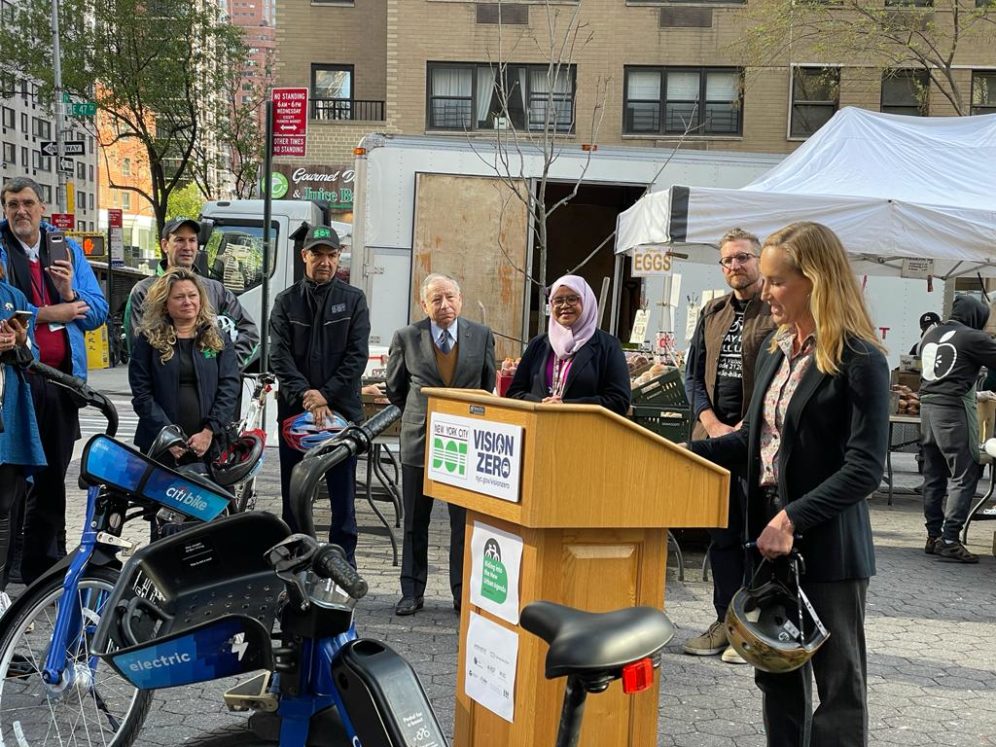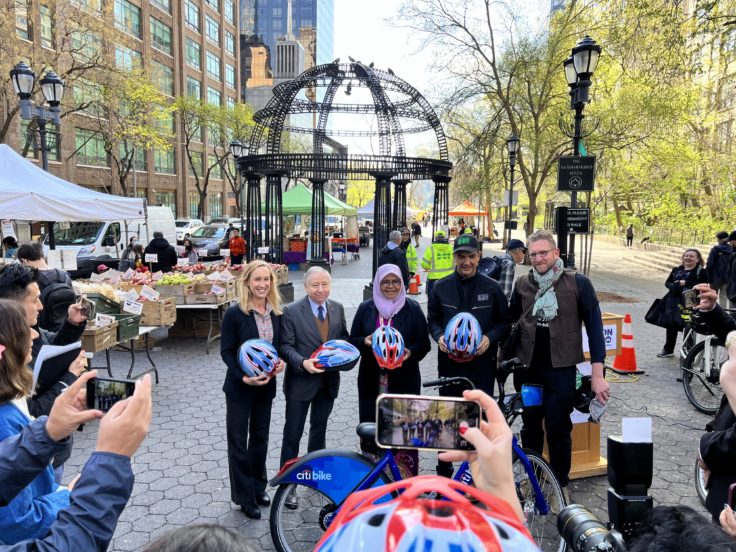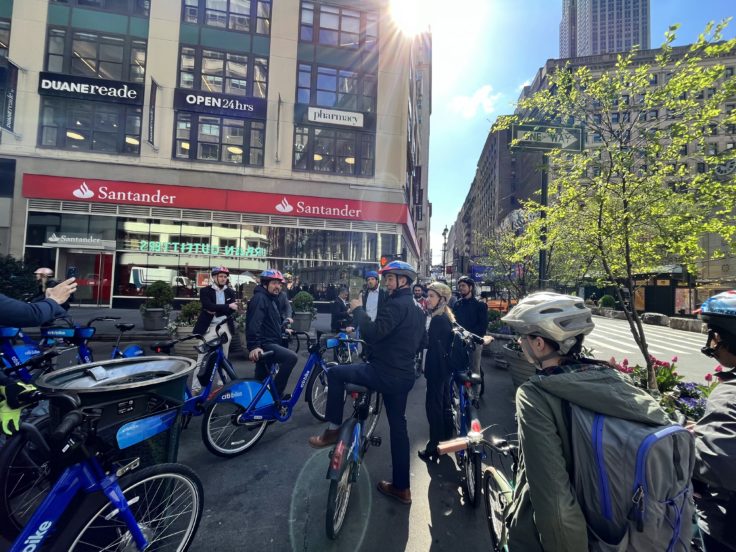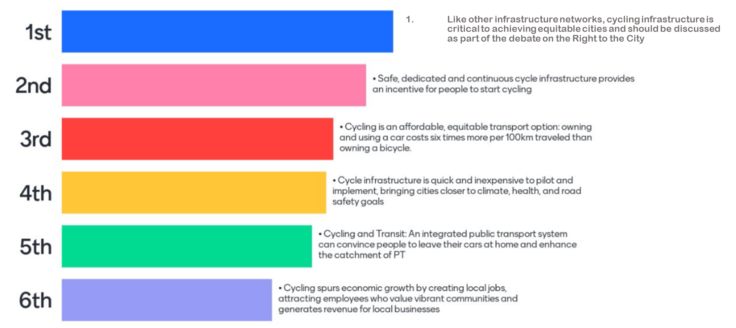
April 28, 2022
Riding Into A New Urban Agenda
On April 27th, UN-Habitat and ITDP hosted Riding into a New Urban Agenda, a bike ride and discussion event ahead of the UN General Assembly’s High-Level Meeting in New York City. The event called attention to cycling as an essential transportation mode and basic service for promoting more equitable and livable cities. In recent years, and especially as a result of the COVID-19 pandemic, momentum has been growing at the international level to expand access to cycling in order to advance equity, curtail fossil fuel dependency, and slow the impacts of climate change. Notably, the UN General Assembly unanimously adopted a resolution in March of this year calling for improved integration of bicycles with public transit as a way to address climate change.
As the UN General Assembly convenes on April 28th to discuss the implementation of the New Urban Agenda, which was adopted six years ago in Quito, Ecuador at Habitat III, the bike ride aimed to highlight cycling as an urgent priority for cities worldwide. The Agenda represents a shared vision for a better and more sustainable future and puts an emphasis on well-planned and well-managed urbanization as a powerful tool for sustainable development. Included in the Agenda is a “Right to the City” approach, which states that all citizens, not just the wealthy and political elite, can influence city policies and design.
“For too long, cities were claimed for cars and not people, resulting in traffic jams, pollution and road fatalities,” said UN-Habitat Executive Director Maimunah Mohd Sharif. “New York has inspired us during the [Riding into a New Urban Agenda] bicycle ride with efforts to reclaim space for pedestrians and cyclists. Cycling has become an integral part of life — building safe and connected infrastructure can increase cycling immensely. This is a unique window of opportunity for change in the way we organize our transport systems.”
Growing demand for cycling infrastructure lays the foundation for reclaiming urban space and promoting more equitable and sustainable mobility for more people — especially those who have been historically underserved. Like energy, stormwater, bus and sewage systems, cycle networks must be carefully planned, implemented, and maintained to truly guarantee livability and equal access to urban life. In the Agenda, cycling is strongly linked to creating healthier and safer public spaces; more cultural exchange; more participatory processes; economic vibrancy and an improved quality of life in cities.

Riding into a New Urban Agenda was formulated as a public call-to-action to center cycling in the Agenda’s implementation in advance of the High-Level Meeting. UN-Habitat, ITDP and its key partners organized the event around the U.N. Headquarters to urge local and global officials to focus on cycling investment and infrastructure as a key pathway towards meeting the mobility goals of the Agenda.
“Building and transforming cities for all people has been a central pillar of ITDP’s mission for more than 35 years,” said ITDP CEO Heather Thompson. “With high-profile, cycling-centered events like this one and through ITDP’s global Cycling Cities campaign, we are helping cities’ governments reach climate goals and provide their residents with an active, safe and necessary alternative to high-polluting vehicles. I believe the time to act is now.”
The ride was supported by a number of notable institutions and organizations, including Transportation Alternatives, the New York City Department of Transportation, the Urban Pathways project, the UN Road Safety Fund, and the UN Special Envoy for Road Safety. Bikes were provided by Lyft’s Citibike, New York City’s primary bike share operator. The ride and flag-off were attended by UN Member State representatives, local advocacy organizations, media outlets, and high-profile individuals, such as:
- Maimunah Mohd Sharif, Executive Director of UN-Habitat
- Heather Thompson, CEO of ITDP
- Ydanis Rodriguez, Commissioner of the NYC Department of Transportation
- Jean Todt, UN Special Envoy for Road Safety
- Paul White, ITDP Board President and Senior Director of Superpedestrian
- Laura Fox, General Manager, Citibike
- Elizabeth Adams, Senior Director, Transportation Alternatives

“The science speaks loud and clear. We are in a race against time to reduce transportation emissions to help fight this climate crisis,” said New York City Department of Transportation Commissioner Ydanis Rodriguez. “Everyone regardless of their socio-economic background should have access to safe and greener modes of transportation and, under [NYC] Mayor Adams, we’re placing equity front and center as we build a more sustainable city.”
Following the bike ride, UN-Habitat and ITDP hosted a panel discussion and side event to highlight representatives from local and regional governments and transportation partners around the world. Participants shared their experiences promoting cycling as a basic urban service that enables more resilient, equitable transportation systems for their communities. The side event invited more than 150 participants worldwide to vote for the key messages to be tabled at the High-Level Meeting — and it became evident that cycling infrastructure is critical to achieving the sustainable and equitable cities envisioned in the New Urban Agenda. Participants also voted high priority for safe, dedicated, and continuous cycling infrastructure that provides an incentive for people to start cycling.

A number of key officials and transportation advocates participated in the side event, including:
- Maimunah Mohd Sharif, Executive Director, UN-Habitat
- Olga Algayerova, Executive Secretary, UNECE
- Jean Todt, UN Special Envoy for Road Safety
- Heather Thompson, CEO, ITDP
- Claudio Orrego, Elected Governor of Santiago de Chile
- Fiona Bull, Physical Activity, World Health Organization
- Areli Carreon, Bicycle Mayor of Mexico City
- Michael King, Urbanist & Traffic Calmer
Ultimately, the day’s events highlighted that this is a unique and critical window of opportunity for change in the way we structure our transit systems, building on the impacts of the COVID-19 pandemic and the momentum behind cities’ efforts to expand public space, walking, and cycling. There was a strong consensus amongst the days’ participants on the urgency to act now and invest in cycling infrastructure to combat climate change and transform our cities for the better — and that there is no time left for delays.
View the full recording of the side event and panel discussion.
View Streetfilms’ coverage of the event and a summary video produced by ITDP below.
